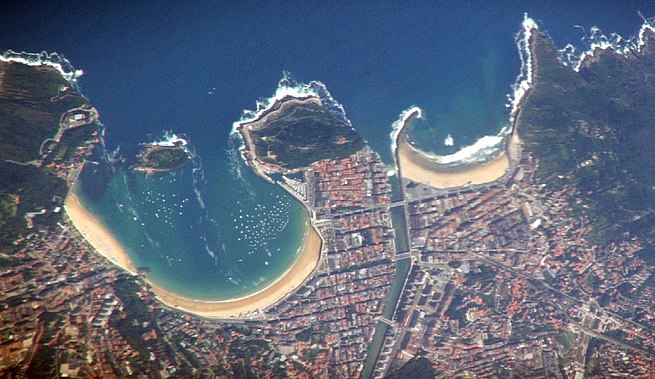
Main Difference
The main difference between Bay and Harbor is that the Bay is a body of water connected to an ocean or lake, formed by an indentation of the shoreline and Harbor is a place where ships may shelter.
-
Bay
A bay is a recessed, coastal body of water that directly connects to a larger main body of water, such as an ocean, lake, or another bay. A large bay is usually called a gulf, sea, sound, or bight. A cove is a type of smaller bay with a circular inlet and narrow entrance. A fjord is a particularly steep bay shaped by glacial activity.
Bays can be the estuary of a river, such as the Chesapeake Bay, an estuary of the Susquehanna River. Bays may also be nested within each other; for example, James Bay is an arm of Hudson Bay in northeastern Canada. Some large bays, such as the Bay of Bengal and the Hudson Bay, have varied marine geology.
The land surrounding a bay often reduces the strength of winds and blocks waves. Bays were significant in the history of human settlement because they provided a safe place for fishing. Later they were important in the development of sea trade as the safe anchorage they provide encouraged their selection as ports.
The United Nations Convention on the Law of the Sea (UNCLOS), also called the Law of the Sea defines a bay as a well-marked indentation whose penetration is in such proportion to the width of its mouth as to contain land-locked waters and constitute more than a mere curvature of the coast. An indentation shall not, however, be regarded as a bay unless its area is as large as, or larger than, that of the semi-circle whose diameter is a line drawn across the mouth of that indentation.
-
Harbor
A harbor or harbour (see spelling differences; synonyms: wharves, haven) is a body of water where ships, boats, and barges seek shelter from stormy weather, or are stored for future use. The term harbor, referring primarily to a sheltered body of water, is often used interchangeably with port, which is a man-made facility built for loading and unloading vessels and dropping off and picking up passengers. Ports usually include one or more harbors. Alexandria Port is an example of a port with two harbors.
Harbors may be natural or artificial. An artificial harbor can have deliberately constructed breakwaters, sea walls, or jettys or they can be constructed by dredging, which requires maintenance by further periodic dredging. An example of an artificial harbor is Long Beach Harbor, California, United States which was an array of salt marshes and tidal flats too shallow for modern merchant ships before it was first dredged in the early 20th century. In contrast, a natural harbor is surrounded on several sides by prominences of land. Examples of natural harbors include Sydney Harbour, Australia and Trincomalee Harbour in Sri Lanka.
-
Bay (noun)
A berry.
-
Bay (noun)
, a tree or shrub of the family Lauraceae, having dark green leaves and berries.
-
Bay (noun)
Bay leaf, the leaf of this or certain other species of tree or shrub, used as a herb.
-
Bay (noun)
The leaves of this shrub, woven into a garland used to reward a champion or victor; hence, fame, victory.
-
Bay (noun)
A tract covered with bay trees.
-
Bay (noun)
A kind of mahogany obtained from Campeche in Mexico.
-
Bay (noun)
A body of water (especially the sea) more or less three-quarters surrounded by land.
-
Bay (noun)
A bank or dam to keep back water.
-
Bay (noun)
An opening in a wall, especially between two columns.
-
Bay (noun)
An internal recess; a compartment or area surrounded on three sides.
-
Bay (noun)
The distance between two supports in a vault or building with a pitched roof.
-
Bay (noun)
Each of the spaces, port and starboard, between decks, forward of the bitts, in sailing warships.
-
Bay (noun)
A bay platform.
-
Bay (noun)
A bay window.
-
Bay (noun)
The excited howling of dogs when hunting or being attacked.
-
Bay (noun)
The climactic confrontation between hunting-dogs and their prey.
-
Bay (noun)
A state of being obliged to face an antagonist or a difficulty, when escape has become impossible.
-
Bay (noun)
A brown colour/color of the coat of some horses.
“color panel|6F4E37”
-
Bay (noun)
A horse of this color.
-
Bay (verb)
To howl.
-
Bay (verb)
To bark at; hence, to follow with barking; to bring or drive to bay.
“to bay the bear”
-
Bay (verb)
To pursue noisily, like a pack of hounds.
-
Bay (adjective)
Of a reddish-brown colour (especially of horses).
-
Harbor (noun)
Shelter, refuge.
-
Harbor (noun)
Any place of shelter.
“The neighborhood is a well-known harbor for petty thieves.”
-
Harbor (noun)
A house of the zodiac, or the mansion of a heavenly body.
-
Harbor (noun)
A sheltered expanse of water, adjacent to land, in which ships may dock or anchor, especially for loading and unloading.
“A harbor, even if it is a little harbor, is a good thing, since adventurers come into it as well as go out, and the life in it grows strong, because it takes something from the world, and has something to give in return – Sarah Orne Jewett”
-
Harbor (noun)
A mixing box for materials in glass-working.
-
Harbor (verb)
To provide a harbor or safe place for.
“The docks, which once harbored tall ships, now harbor only petty thieves.”
-
Harbor (verb)
To take refuge or shelter in a protected expanse of water.
“The fleet harbored in the south.”
-
Harbor (verb)
To hold or persistently entertain in one’s thoughts or mind.
“She harbors a conviction that her husband has a secret, criminal past.”
